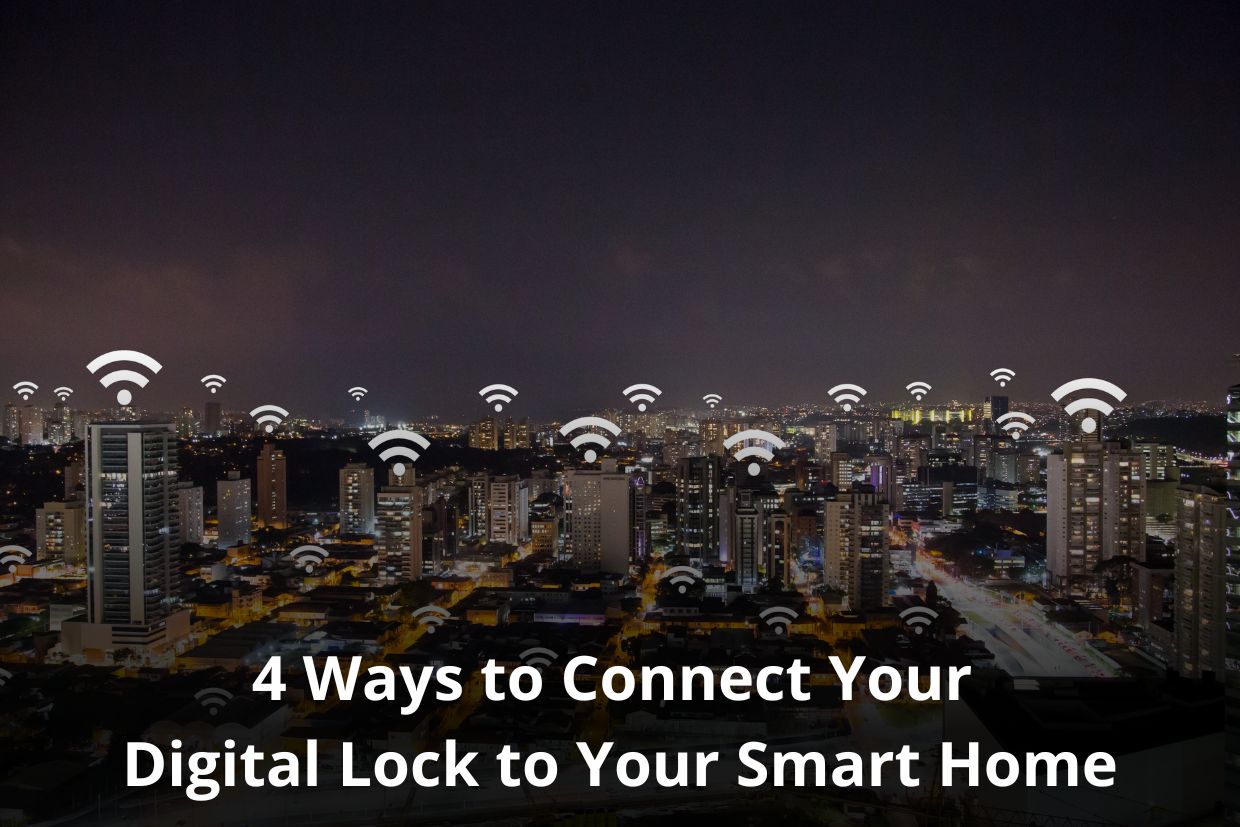Technology has invited its way into homes, turning the old-school security system you used to know about into a high-tech paradise. We are talking about the integration of a Smart Home in Singapore, which is slowly but surely gaining traction among Singaporean homeowners who want to elevate their current state of home security. The concept is easy to understand; Smart Home integration can connect a plethora of electronic devices and appliances all over the house, enabling remote and automated management.
Here’s an example: you need to go out, and on usual days, you walk to the door to manually unlock and lock the door. But when you have a digital lock that is paired with Smart Home integration, you just have to voice out your command or tap a few times on your smartphone screen, even if you are not physically near the door! How cool is that? That is one of the many ways smart homes work, and in this guide, we will focus on how to link your digital lock to Smart Home Singapore and not to forget to use some help from Yew Digital!
Understanding Connectivity Options for Digital Locks.

Think of connectivity as the right mode of communication between integration and the digital lock. For proper exchange of information, compatibility is key. When choosing your mode of integration or protocol, ensure that it is the most compatible to streamline functions with both the digital lock and Smart Home system. Full compatibility will allow a smooth working experience across all devices.
Next up, understanding the features they are entailed with. Many emerging Smart Home system protocols are embedded with many new developments and features that operate with better functionality. If you are someone who prioritises technology, it is always good to look for future-proof systems that offer various cutting-edge integration features.
Security features included in the Smart Home Singapore integration protocols are another important element to look for. Security is paramount and considering a protocol with a range of benefits such as CCTV integration, time sensitivity for entry and exits, and alarm systems for code red situations are some of the essential security setups you need to consider.
Exploring Connectivity Options for Smart Home Singapore
A handful of the popular integration options for Smart Home Singapore we will be discussing in this section are Z-Wave, Zigbee, Wi-Fi, and Bluetooth. Here is an in-depth dive:
Z-Wave
Z-Wave forms mesh networking, passing signals from one device to another. The mechanism works like a repeater which allows extending signals in a complex manner. This is an ideal choice for large houses and businesses. Z-Wave locks in robust security and encryption for safe communication across your devices. Many brands support Z-Wave; however, check with the user manual or website for a list of compatible devices that connect your digital lock with Smart Home Singapore systems.
- Strengths – Z-Wave protocols are known for its encryption properties reducing chances of security threats or system hacking even for larger networks. Z-Wave is popular for its long-range signal reliability and stability to maintain strong communication across devices.
- Limitations – Z-Wave depends upon hub connectivity, which means an external hub is required to communicate between devices. This may be an additional cost to incur and carry maintenance.
Zigbee
Zigbee is also another mesh networking protocol. It is popular for its energy efficiency and low-power consumption. If your digital lock is battery-powered, Zigbee would be an ideal choice to make specially for its long-power running capabilities. Zigbee is supported by many popular brands in the home security market currently but it is always a good idea to check compatibility with the brand you are buying from.
- Strengths – Like mentioned, Zigbee is one of the most energy-efficient protocols in the market. The security encryption is strong and you need not worry about your data leaking to outsiders. Zigbee also offers a wide range of signals across many devices.
- Limitations – Similar to Z-Wave, Zigbee also requires an additional hub to enable signal passing between the digital lock and Smart Home Singapore integration.
Wi-Fi
With Wi-Fi connectivity, you can easily and peacefully achieve user-friendly advantages of a Smart Home. Using Wi-Fi as a connectivity protocol for Smart Home integration brings convenience and it is especially true if you already have a pre-existing Wi-Fi network. The installation process of the digital lock and connectivity to smart home networking will be so easy for those who already have stable Wi-Fi in their homes.
- Strengths – Wi-Fi offers wide coverage of networking across many devices in your home or property, and often this is recognised as an advantage of Wi-Fi protocol. And when it comes to compatibility between devices, there is so little to almost nothing to worry about because many devices are compatible with Wi-Fi. Wi-Fi does not require an additional hub to enable communication between the lock and home devices; therefore, that hassle is cleared out as well.
- Limitations – This protocol functionality depends heavily on connectivity and the stability of the network. If there are constraints in networking speeds or stability, there may be certain dysfunctions in the integration. So, it is important to be cautious of the state of your Wi-Fi at all times. Another drawback is that the security of this protocol cannot be guaranteed 100%. If no proper measures are taken to secure your Wi-Fi connection, there may be threats of possible hacking. So, that is another one to be cautious about.
Bluetooth.
Bluetooth protocol is the ultimate convenient method of integrating your home security system with your devices. Connecting to the Smart Home Singapore integration via smartphone, tablet, or even smartwatch can offer hands-free and hassle-free modes of controlling and managing your lock. Downloading the digital lock app to your devices will allow you to manage all lock features and receive all related notifications and alerts.
- Strengths – For basic digital lock processes, Bluetooth is recommended for its reliability on functionality. As an easy method of managing and remotely accessing the lock, Bluetooth is highly user-friendly. Just a few taps on the phone screen and you have the control of your security system in the palm of your hand.
- Limitations – Bluetooth offers a limited range of connectivity due to its structural nature. You need not be physically manoeuvring the lock, but you need to be in close proximity to the lock for the signals to pass.
Unlocking the Potential: Smart Home Singapore Automation.

Once you have successfully integrated your digital lock into Smart Home Singapore, let me tell you, the possibilities are endless. A system where the entirety of your home devices and appliances are interconnected using premium technology brings incredible benefits.
First off, you will permanently get rid of the hassle of scraping the bottom of your bag to find your keys to the door. As you reach close to the door, the system will pick up a possible entry, and a recommendation should pop up on your phone screen indicating whether to unlock the door. Not only that but if there are other members of the family logged into the Smart Home Singapore integration, they will be notified that you accessed the front door. So you see, security, comfort, and ease are all in one with Smart Home Singapore.
FAQs
Here are some of the commonly raised questions to consider in additional:
- Can I connect any digital lock to a smart home in Singapore?
No, not all digital locks can connect to smart home Singapore integration. It is a crucial step to identify whether the lock is compatible with the integration system as well as the protocol. Make sure the digital lock you are going with is compatible with all the above conditions.
- What is the difference between Z-Wave and Zigbee?
Both Z-Wave and Zigbee are mesh network protocols and they allow compatibility with most devices. However, the difference would be that Z-Wave has a larger signal range than Zigbee.
- Which protocol is better for Smart Home Singapore integration?
This may depend on your requirements and preferences. For large homes that require strong connectivity, Z-Wave and Zigbee are ideal. However, note that both require an external hub. Whereas if you are looking for convenience, Wi-Fi is the best option considering its stability with a strong network. If you are looking for remote management, Bluetooth is ideal due to its smartphone control properties.
Finally…
The full potential of your home is yet to be discovered. If you have a misconception that enhancing home security takes a complicated and rigid process, it is not true at all. Thanks to cutting-edge innovations such as digital security systems, you can now enjoy the comforts of elevated security and seamless convenience in just a few steps. If you are a digital lock owner, this is your calling to look into smart home integration systems. Have complete access to all devices across your home, starting from the front door!


